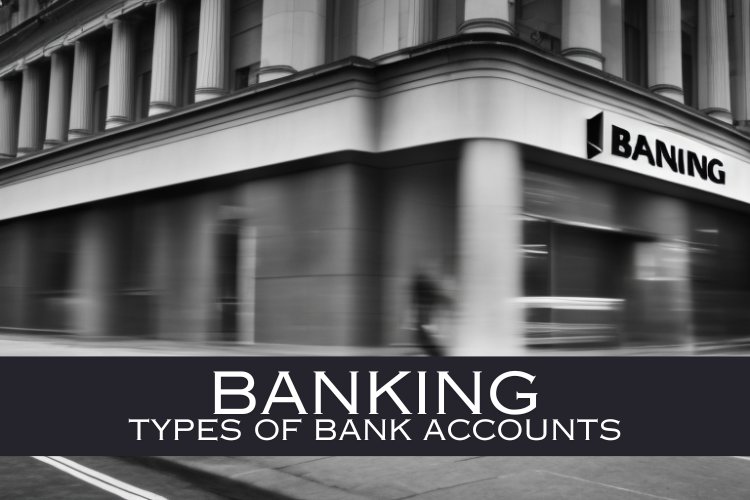Exploring different types of bank accounts and their features
In this article, we will explore the various bank account options available to individuals, such as savings accounts, checking accounts, money market accounts, certificates of deposit (CDs), retirement accounts, and specialty bank accounts.

Exploring different types of bank accounts and their features
1. Introduction to Bank Accounts
Bank accounts are an essential tool for managing personal finances and achieving financial goals. Whether you're saving for a future purchase, managing daily expenses, or planning for retirement, understanding the different types of bank accounts and their features is crucial. In this article, we will explore the various bank account options available to individuals, such as savings accounts, checking accounts, money market accounts, certificates of deposit (CDs), retirement accounts, and specialty bank accounts. By examining the unique features, benefits, and considerations of each account type, you will gain the knowledge and confidence needed to make informed decisions about your financial future. Let's dive into the world of bank accounts and discover the possibilities they offer.
Understanding the Basics of Bank Accounts
Bank accounts are like the Swiss Army knives of personal finance; they serve a multitude of purposes and can come in handy in various situations. At their core, bank accounts are financial tools provided by banks that allow individuals to securely manage their money. They offer a safe place to store funds, make transactions, and access additional banking services.
The Importance of Having a Bank Account
Having a bank account is more than just a convenient way to keep track of your finances. It's a gateway to financial stability and numerous benefits. With a bank account, you can deposit your income, pay bills, receive direct deposits, and even earn interest on your savings. It also provides a layer of security as opposed to keeping all your cash under the mattress, which, let's face it, isn't the smartest idea.
2. Savings Accounts: Features and Benefits
Benefits of a Savings Account
A savings account is the financial equivalent of a piggy bank with superpowers. It's a perfect tool for setting aside money for future goals, emergencies, or that dream vacation. Besides keeping your money safe, savings accounts offer interest on your deposits, allowing your money to grow over time. Plus, they provide easy access to your funds, so you can withdraw them whenever needed (though we don't recommend raiding the piggy bank for impulsive shopping sprees).
Interest Rates and APY
When it comes to savings accounts, interest rates are the name of the game. The higher the interest rate, the more your savings will grow. Annual Percentage Yield (APY) is a fancy term that takes into account compound interest and can give you a better idea of how much you can earn. So, keep an eye out for those juicy interest rates and APYs; your future self will thank you.
Minimum Balance Requirements
While saving money is important, some savings accounts come with minimum balance requirements. These are just the bank's way of making sure you don't leave them high and dry. Usually, the higher the minimum balance, the more perks the account offers, like higher interest rates or waived fees. Just make sure you can meet the requirements without compromising your budget or resorting to eating ramen noodles for every meal.
3. Checking Accounts: Managing Daily Finances
Features and Functions of a Checking Account
If savings accounts are the piggy banks, checking accounts are the workhorses that handle your daily financial needs. They give you a safe place to deposit your paychecks, pay bills, and make everyday purchases. With a checking account, you can easily access your money through ATMs, online transfers, or good old-fashioned checks (for those rare moments when you need to write a personal note and pay for something at the same time).
Debit Cards and Check Writing
When it comes to convenience, nothing beats a debit card. It allows you to swipe, tap, or insert your way to retail therapy without the need to carry wads of cash. On the other hand, check writing may seem a bit old-fashioned, but it still has its niche uses, like paying rent or settling an IOU with a friend who conveniently forgot their wallet.
Overdraft Protection
Ah, overdraft protection—the hero of the forgetful, the savior of those who sometimes miscalculate their spending. Overdraft protection is a feature offered by many checking accounts that prevent embarrassing situations like having your debit card declined. It allows you to spend a bit more than what's in your account, but remember, it's not an excuse to go on a spending spree. Overdraft fees can quickly turn into your financial archenemy.
4. Money Market Accounts: Balancing High Yields and Liquidity
Overview of Money Market Accounts
Money market accounts are the chameleons of the banking world; they combine features of both savings and checking accounts. They offer higher interest rates than regular savings accounts while providing the convenience of check-writing and debit cards. It's like having the best of both worlds—you can let your money grow while still being able to access it when needed.
Comparing Money Market Accounts to Savings Accounts
Money market accounts and savings accounts are like siblings; they share many similarities, but each has its own unique twists. Money market accounts often have higher minimum balance requirements and may offer tiered interest rates, meaning the more you deposit, the more interest you earn. If you have a larger nest egg and want to maximize your interest earnings without sacrificing access to your funds, a money market account might be just the ticket.
Accessing Funds from a Money Market Account
When it comes to accessing funds from a money market account, you usually have a bit more flexibility compared to a savings account. Many money market accounts offer check-writing privileges or provide a debit card for easy withdrawals. However, keep in mind that some accounts may have limitations on the number of transactions you can make per month, so no splurging on 30 cups of designer coffee in a single day.
5. Certificates of Deposit (CDs): Securing Fixed Returns
Understanding Certificates of Deposit
Certificates of Deposit, or CDs for short, are a popular option for people looking to earn a fixed return on their savings. Think of it as lending money to the bank for a set period of time, and in return, the bank pays you interest.
Term Length and Interest Rates
CDs come with different term lengths, ranging from a few months to several years. The longer the term, the higher the interest rate you can expect. So, if you're not in a rush to access your funds, a longer-term CD could be a good choice to maximize your returns.
Early withdrawal penalties
One thing to keep in mind with CDs is that if you need to withdraw your money before the end of the term, you'll usually face an early withdrawal penalty. This penalty is typically a percentage of the interest earned or a set number of months' worth of interest. So, make sure you're comfortable locking away your funds for the full term before investing in a CD.
6. Retirement Accounts: Planning for the Future
Overview of Retirement Accounts
Retirement accounts are specifically designed to help you save for your golden years. They offer tax advantages, and the money you contribute grows over time. It's like giving yourself a high-five in the future!
Traditional IRAs and Roth IRAs
Two common types of retirement accounts are traditional IRAs and Roth IRAs. Traditional IRAs allow you to contribute pre-tax income, which means you'll get a tax break now but will pay taxes on withdrawals later. Roth IRAs, on the other hand, accept after-tax contributions and offer tax-free withdrawals in retirement.
Contributions, Tax Benefits, and Withdrawal Rules
The amount you can contribute to retirement accounts is typically limited each year, but the good news is that you may be eligible for tax deductions or credits when contributing. It's important to note that both traditional and Roth IRAs have different withdrawal rules, so make sure you understand these before tapping into your nest egg.
7. Specialty Bank Accounts: Tailored Solutions for Specific Needs
Types of Specialty Bank Accounts
Need a bank account that suits your specific needs? Look no further than specialty bank accounts. These accounts are customized to cater to various situations, such as business accounts, student accounts, and more.
Business Accounts: Supporting Entrepreneurial Ventures
If you're a budding entrepreneur, a business account can help you manage your finances more efficiently. It offers features like invoicing, merchant services, and even business loans. Plus, having a separate business account makes tax time a whole lot easier.
Student Accounts: Managing Finances During Education
For students, managing finances can be challenging. That's where student accounts come in. They often come with lower fees, special discounts, and features like mobile banking to help you stay on top of your money while juggling assignments and exams.
8. Conclusion: Choosing the Right Bank Account for You
Factors to Consider When Selecting a Bank Account
When it comes to choosing the right bank account, several factors should influence your decision. These include your financial goals, banking needs, fees, interest rates, and the level of customer service provided. Take the time to evaluate your options and find the account that aligns with your needs and preferences.
Making an informed decision
Ultimately, the right bank account is the one that suits your individual circumstances. Whether you prioritize flexibility, high-interest returns, or specialized features, understanding the different types of bank accounts available empowers you to make an informed decision. So, take charge of your finances, explore your options, and choose the account that puts a smile on your face and money in your pocket. Happy banking!
Choosing the Right Bank Account for You
When it comes to selecting a bank account, it's important to assess your individual financial needs, goals, and preferences. Whether you prioritize high yields, easy access to funds, or specific account features, there is a bank account out there that can meet your requirements. Take the time to compare the different types of bank accounts, consider their features and benefits, and weigh them against your personal financial situation. By choosing the right bank account, you can effectively manage your money, save for the future, and achieve your financial aspirations. Start exploring the various bank account options today and take control of your financial journey.
FAQ
1. Can I open multiple bank accounts?
Yes, you can open multiple bank accounts. In fact, many people find it beneficial to have different accounts for different purposes, such as a savings account for long-term goals and a checking account for daily transactions. Opening multiple bank accounts can help you better organize your finances and allocate your funds according to your needs.
2. What factors should I consider when choosing a bank account?
Several factors should be considered when choosing a bank account. These include the interest rates or APY offered, any fees associated with the account, minimum balance requirements, access to ATMs, online banking features, customer service, and the overall reputation and stability of the bank. It's essential to assess these factors based on your individual preferences and financial goals.
3. Are there any risks associated with bank accounts?
Bank accounts are generally considered safe and secure. However, it's important to be aware of the FDIC (Federal Deposit Insurance Corporation) insurance limit for each account. Currently, the FDIC insures deposits up to $250,000 per depositor, per bank. It's advisable to ensure that the total of your deposits does not exceed this limit to fully protect your funds.
4. Can I switch bank accounts if I'm not satisfied with my current one?
Yes, you can switch bank accounts if you're not satisfied with your current one. Many banks offer a hassle-free process to transfer funds and set up a new account. Before switching, it's recommended to thoroughly research and compare different bank account options to find one that better suits your needs. Additionally, be mindful of any potential fees or requirements associated with closing your current account.
TradeFxP Features
If you choose to be a self-employed retail trader, here are a few things we offer:
- The best trading platform
- No Requotes
- Lowest Spreads
- High-level liquidity
- Interbank connectivity
- Pure STP/DMA/ECN
- Free signals
- Best support
- Crypto Wallet and withdrawals / Deposits (USDT)
- Robust CRM
- TradeFxP wallet
- Once click withdrawal
- Multiple payment options
- Local offices to walk in
- Free VPS
- Free Video Chat / Virtual Meetings
- And many more…
If you choose to be a part of our managed account programme,
- All of the above +
- 1-2% Daily Profits
- High-level risk management
- Capital protection
- Only 30% of the capital used
- Negative balance protection
- Our fee is from the profits only
- Monthly profit withdrawal
- Wallet system – Use it like Phonepe, or Google Pay
- Crypto wallet and withdrawals / Deposits (USDT)
- Live monitoring
- MyFxbook Live monitoring
- Copy Trading
- And many more…
Optional: If you do not withdraw your profits for 2 months, our system will use those profits to trade and will keep your 100% capital safe and secure for margin purposes. This is optional, and if you choose not to be a part of it, you can withdraw your profits from the first month itself.
Why 1-2% daily? Can't your managed forex account earn more?
Yes, we can! Remember: greed may be good in the beginning, but in the end, it will destroy everything. You and I know that! Many droplets make an ocean! Join the Managed Account Programme and sit back for six months, then look at your account. You'll see that our strategy is good and the best. Do you know what I mean?
If you choose to be a part of us as an introducing broker (IB) or channel partner,
- Industry-best rebates
- Local Office support
- Staff support
- Marketing support
- Marketing materials
- And many more…
Having said that,
You can join our Forex Managed Account programme and earn 1-2% profits daily. See for yourself by clicking the below link.
Have a great journey, and may you catch some big waves on your way to prosperity!
To see Ai Forex Trading for real, use these credentials.
- Low-risk strategy:
- Mt4: 112018
- Pw: Allah@101
- Server: tradefxp live,
1. To read why you should be with us, click here.
2. To open an account, click here.
3. To see our regulation certificate, click here.
4. To see our news with the IFMRRC, click here.
5. For claims, click here.
6. For the main site, click here.
7. For blogs and articles, click here.
8. Main Website: www.TradeFxP.com



 admin
admin 










